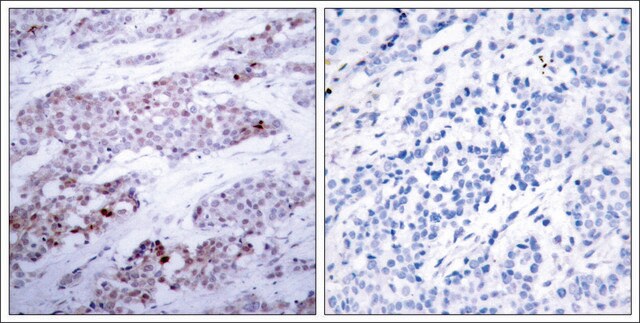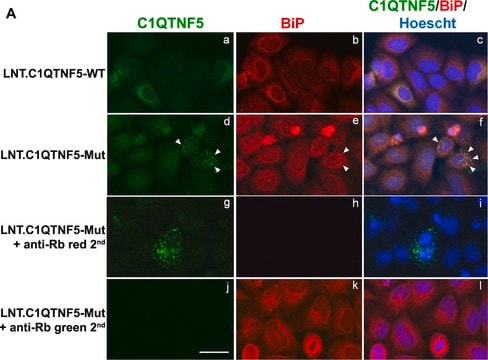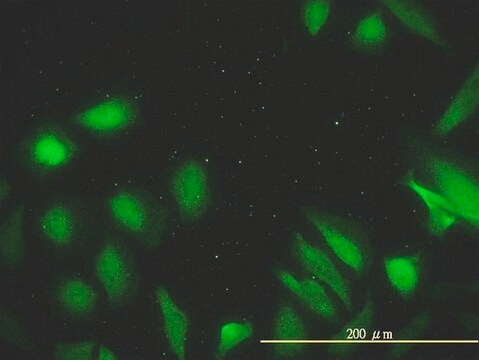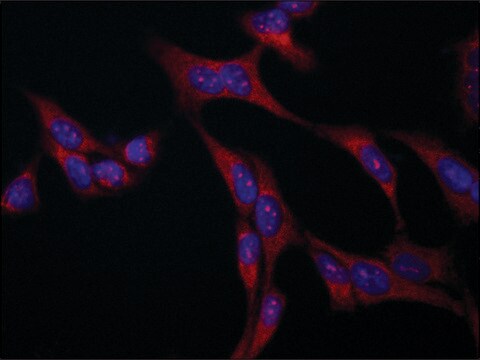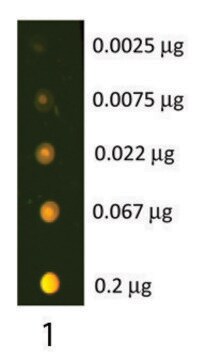추천 제품
생물학적 소스
rabbit
Quality Level
결합
unconjugated
항체 형태
affinity isolated antibody
항체 생산 유형
primary antibodies
클론
polyclonal
양식
buffered aqueous solution
분자량
antigen ~90 kDa
종 반응성
mouse, human
농도
~1.0 mg/mL
기술
indirect immunofluorescence: 5-10 μg/mL using paraformaldehyde fixed HUVEC cells.
western blot: 0.25-0.5 μg/mL using lysates of NIH-3T3 or PC12 cells.
UniProt 수납 번호
배송 상태
dry ice
저장 온도
−20°C
타겟 번역 후 변형
unmodified
유전자 정보
human ... PTPRA(5786)
mouse ... PTPRA(19262)
일반 설명
PTPRA is a transmembrane phosphatase that regulates cell proliferation, cell adhesion, integrin signaling, and growth factor response. This phosphatase also activates proteins of the Src family. PTPRA inhibits cell growth in breast cancer and contributes to tumorigenesis in colon carcinoma . Anti-PTPRA antibody is specific for human and mouse PTPRA. In immunoblotting, detection of the PTPRA band is specifically inhibited by the immunizing peptide.
Protein tyrosine phosphatase alpha (PTPRA) is a transmembrane phosphatase with a relatively short, highly glycosylated extracellular domain, a transmembrane domain, and a tandem phosphatase domain. The amino-terminal domain predominantly mediates catalytic activity, whereas the carboxyterminal domain serves as a regulatory subunit.
면역원
synthetic peptide corresponding to an internal region of human PTPRA, conjugated to KLH. The corresponding sequence is identical in mouse and differs by one amino acid in rat.
애플리케이션
Anti-PTPRA antibody is suitable for use in western blot (0.25-0.5 μg/mL using lysates of NIH-3T3 or PC12 cells) and indirect immunofluorescence (5-10 μg/mL using paraformaldehyde fixed HUVEC cells).
Anti-PTPRA antibody produced in rabbit has been used in immunoblotting and immunofluorescence.
생화학적/생리학적 작용
Protein tyrosine phosphatase alpha (PTPRA) is implicated in several signaling pathways, including insulin receptor signaling, cellular transformation and cell spreading and migration. It regulates cell proliferation, cell adhesion, integrin signaling, and growth factor response. PTPRA inhibits cell growth in breast cancer and contributes to tumorigenesis in colon carcinoma.
물리적 형태
Solution in 0.01 M phosphate buffered saline, pH 7.4, containing 15 mM sodium azide.
면책조항
Unless otherwise stated in our catalog or other company documentation accompanying the product(s), our products are intended for research use only and are not to be used for any other purpose, which includes but is not limited to, unauthorized commercial uses, in vitro diagnostic uses, ex vivo or in vivo therapeutic uses or any type of consumption or application to humans or animals.
적합한 제품을 찾을 수 없으신가요?
당사의 제품 선택기 도구.을(를) 시도해 보세요.
Storage Class Code
10 - Combustible liquids
Flash Point (°F)
Not applicable
Flash Point (°C)
Not applicable
가장 최신 버전 중 하나를 선택하세요:
K Tabiti et al.
Cancer letters, 93(2), 239-248 (1995-07-13)
The protein tyrosine phosphatase alpha (PTP alpha) mRNA level in paired samples of late stage (Dukes' D) colorectal tumors and adjacent normal colon mucosa was quantified by RNase protection assays. After normalization against 18S RNA or beta-actin mRNA level, a
Receptor-type protein tyrosine phosphatases in cancer
Du Yu and Grandis JR
Chinese Journal of Cancer, 34(2), 61-61 (2015)
N X Krueger et al.
The EMBO journal, 9(10), 3241-3252 (1990-10-01)
Protein tyrosine phosphatases (PTPases), together with protein tyrosine kinases, regulate the tyrosine phosphorylation that controls cell activities and proliferation. Previously, it has been recognized that both cytosolic PTPases and membrane associated, receptor-like PTPases exist. In order to examine the structural
E Ardini et al.
Oncogene, 19(43), 4979-4987 (2000-10-24)
Tyrosine phosphorylation is controlled by a balance of tyrosine kinases (PTKs) and protein tyrosine phosphatases (PTPs). Whereas the contribution of PTKs to breast tumorigenesis is the subject of intense scrutiny, the potential role of PTPs is poorly known. RPTPalpha is
자사의 과학자팀은 생명 과학, 재료 과학, 화학 합성, 크로마토그래피, 분석 및 기타 많은 영역을 포함한 모든 과학 분야에 경험이 있습니다..
고객지원팀으로 연락바랍니다.